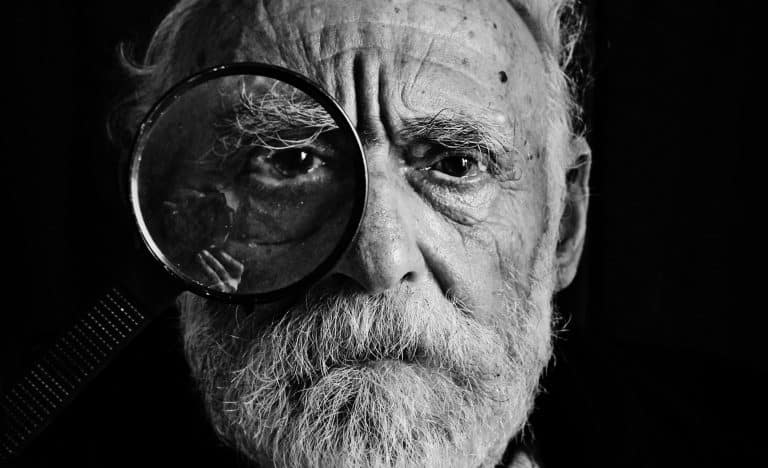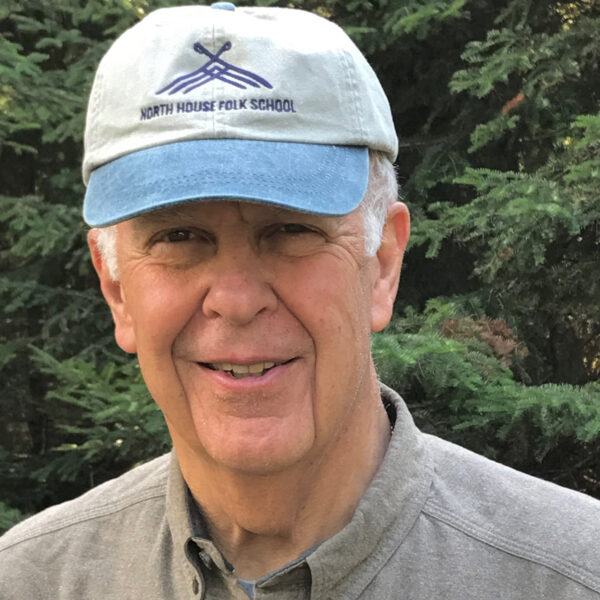
Image by Mari Lezhava/Unsplash, Public Domain Dedication (CC0).
Owning Up to My Toxic Biases
Two weeks ago, my friend Jerry Colonna — chair of the board at Naropa University and an advisor to On Being — sent out a lovingkindness, or mettā, meditation about his struggle with the state of American politics. He began, “With apologies to Saint Francis… Lord grant me the serenity not to bite the hook of my anger and fear.”
Jerry is twenty years younger than me, but I call him my big brother because he’s forever saying things so wise they really tick me off. As I read that line about getting hooked on anger and fear, I thought, “Damn! He’s seen into my soul again and got me dead to rights.” In my religious tradition, there’s only one way forward when you’ve seen your own failings: Confess, ask forgiveness, forgive yourself, and try to get it right next time.
My confession is simple. Daily, I get hooked on my anger about our arrogant and unprincipled president, the poisonous aquifer of white nationalism into which he has consciously tapped, and his endless assaults on almost everything I hold to be good, true, and beautiful. I also get hooked on my fear, but it’s not about “those people” our president wants us to fear. I fear this president and the harm he’s done to my brothers and sisters in the U.S. and abroad, to American democracy, to world peace, and to the earth itself.
Jerry doesn’t say that there’s anything wrong with anger, and I’m glad for that. If I weren’t angry about what’s going down in Washington, D.C., I’d feel like I’d become dumb and numb — and I refuse to go there. Being dumb (and I include myself here) is what got us into this disgusting and dangerous mess, and going numb will keep us in the mess while it gets worse and worse.
Anger isn’t the problem. The problem is getting hooked on anger — addicted to an emotion that gives you a fleeting high but leaves you feeling worse, all the while robbing you of well-being and creating an insatiable desire for the next hit. Being hooked saps me of energy and harms my health. Worse still, it diverts me from taking personal responsibility for what’s going on right now. Here, too, Jerry’s mettā meditation spoke to my condition:
“Grant me the wisdom to see my own unconscious biases that continue to unintentionally and inadvertently make me complicit in this staggering rise of hate and callousness. May I never forget that hate and callousness have been as much part of this American experiment as joy, hope, and love. That while this experience may be new to my consciousness it has been a part of the lives of my fellow Americans who have lacked the access to money and power that come with privilege.”
Some will say that Jerry is calling for a fruitless exercise in self-flagellation. I beg to differ. He’s calling us to self-examination, to self-awareness. It’s a call that goes back at least as far as Socrates:
“The unexamined life is not worth living.”
To which I’d add, the unexamined life is a threat to others.
So, for the umpteenth time, I’m trying to come to terms with my own complicity in white privilege and the injustice and inhumanity that flow from it. When white people like me ignore or deny all that, it’s just another way of aiding and abetting it.
Isn’t the evidence clear-cut? A lot of things that are easy and safe for white folks are difficult or dangerous for people of color — from being pulled over for a broken taillight to trying to rent or buy a home in certain communities. Being president while black is obviously more perilous than it is while white. If Barack Obama had said any of the most egregious things our current president has said, or had had any similar business- or family-related “irregularities,” his political career would have gone down in flames. White privilege is a no-brainer.
But my confession needs to go deeper than owning up to white privilege. Like many people of my race, I carry unconscious elements of white supremacy. If I want to help stem that bloody tide, I must become conscious of that fact.
No, I don’t belonged to or support the KKK and its kin, whose beliefs and actions are evil to the core. But it’s a cop-out to equate white supremacy with its most toxic forms. Doing so takes the onus off people like me to come to terms with reality — our country’s and our own. How could a nation built in part on the enslavement of human beings not have a cultural substrate of white supremacy? How could white people rooted in that ground not be tainted by that toxicity?
If I look at myself closely and honestly, I find a form of white supremacy that’s subtle but pernicious. For a long time I held an unacknowledged assumption that “white is normal,” that white ways are the “normal” ways. All other ways are “exotic” at best, often “strange” and even “off-putting,” and sometimes “scary.”
I suppose all subcultures believe their ways are normal. But in a nation grounded in the enslavement of black people, only we white people get support for that illusion. We don’t need a “white history month” to celebrate our contributions to civilization, we don’t need to encourage each other to believe that “white is beautiful,” and we don’t need to proclaim “white lives matter.” In America, where white people have ruled supreme from day one, all of that comes to us free of charge.
In a world where white people are a minority group, the arrogance of “white is normal” is breathtaking — and like all arrogance, it distorts one’s view of self and world. For example, for 50 years, I’ve written and spoken about the dangers of the American tendency to “other” those who are not white, straight, Christian, etc..
But not until the last decade or two did I understand that I am “the other” to many — I reserved that category for people who don’t fit my delusional “norm.” I didn’t hate or fear “the other,” but seeing “otherness” in everyone but me and “my people” is the road to a sense of superiority and even uglier destinations.
Does all of this make me guilty of something sinister simply because I was born white? Of course not. No one is born guilty of anything. The guilt comes when I deny that being white gives me social advantages and crimps my capacity to see the world clearly and engage it honestly. Denial keeps me from owning my own arrogance, putting on corrective lenses, and fully joining the fight against the pestilence of white supremacy.
Is there any hope for white illusionists like me? As far as I’m concerned, this entire column is about hope — because hope opens up as soon as we gain self-awareness, confess our role in creating injustice, and reach deep for ways to release the better angels of our nature.
Another friend and mentor, Valarie Kaur — a Sikh interfaith leader and civil rights activist whose family has suffered xenophobic violence — is helping me understand what hope in action looks like through her Revolutionary Love project. In a recent newsletter, Valarie wrote,
“White supremacy is as old as America. But so are acts of Revolutionary Love — and every act of love inspires another.”
Then she spoke to the skeptics:
“If you cringe when people say love is the answer, I do too — I’m a lawyer. In America, we only talk about love as a feeling that happens to us if we’re lucky. If love is just a good feeling, then of course it is too fickle, too sentimental, too fleeting to be a force in the face of injustice.”
Through a feminist, woman-of-color lens — inspired by the Sikh concept of the warrior-saint — I believe that Valarie is redefining and reviving the great tradition of nonviolent action in terms that speak to “the fierce urgency of now.” Revolutionary Love is not romantic, but embodied, courageous, and demanding.
To describe it, Valarie draws on the experience of becoming a mother — from the labor pains that can feel like dying to a lifetime of being gentle and fierce in nurturing and protecting the child you love:
“Mothering, a capacity that exists within each of us, helps us redefine love, not just as emotion but as a form of sweet labor. It calls us to wonder about others, listen to their stories, respond to their needs. We employ many emotions in that labor: Joy is the gift of love. Grief is the price of love. Anger is the force that protects it.
When we practice love beyond the threshold of the home, it has the potential to transform the world around us and within us. But love must be poured in all three directions to be revolutionary. Revolutionary Love is the choice to enter into labor — for others, for our opponents, for ourselves. I believe Revolutionary Love is the call of our times.”
When I find myself once again “biting the hook of anger and fear,” and have the guts to ask myself why, I come up with only one honest answer: being hooked drains me of morale, energy, and courage, thus sparing me the challenge of committing acts of revolutionary love.
So — awakened by Jerry Colonna and inspired by Valarie Kaur — I’m practicing a daily two-part gut-check:
1. Where am I today with my “white is normal” delusion?
2. Today am I willing to risk that warrior-saint love that, as Valarie says, “has the power to transform our interior life, our relationships, and social conditions”?
When confession opens the door to hope, and you step through, the next step is action. If you wonder what Revolutionary Love in action looks like, I urge you to view “Divided We Fall,” Valarie Kaur’s documentary. If you want to join the movement, you can sign the Declaration of Revolutionary Love.
The world needs this revolution. America needs it. People of color need it. And white people like me need it, perhaps most of all — if we want to live our lives in service of the twined causes of love, truth, and justice.
